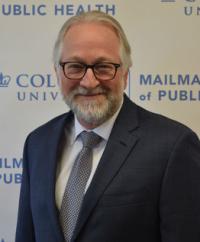Greg A. Freyer, PhD
- Professor of Environmental Health Sciences at CUMC

Overview
Greg Freyer trained as a biochemist and molecular biologist. His research has included some of the first gene cloning experiments, understanding the regulation of mRNA processing, and studying the cells' responses to DNA damage. He has also collaborated on projects looking at environmental factors that contribute to obesity, the genetic basis of epilepsy, and infectious disease modeling. Dr. Freyer is the Faculty Director of Graduate Education in EHS and was the founding Director of the PhD program in EHS. He currently directs the DrPH program in EHS. He teaches multiple courses in the department and school. School-wide, his teaching includes both Environmental and Biological Determinants of Health and is an Instructor in Integration of Science and Practice (ISP) as well as Leadership. In EHS, he teaches Molecular Toxicology, Principles of Genetics and the Environment, and Critical Thinking and Analysis. He also directs the Toxicology Certificate and the MS Toxicology program. He has been recognized for his outstanding teaching with the Excellence in Teaching Award from the Mailman School and the prestigious Presidential Teaching Award from Columbia University. He has co-authored two successful textbooks, DNA Science: A First Course (1st and 2nd editions), and Laboratory DNA Science. He is committed to service to the school and the university. Currently, he is a member of the school-wide Doctoral Committee. As a University Senator, he co-Chairs the Faculty Affairs Committee, the Tenure Track Off Track (TOTT) caucus, and the Joint Benefits Subcommittee and is a member of the Executive Committee and the Budget Committee.
Office Location: 722 West 168th Street, ARB 1107D
Academic Appointments
- Professor of Environmental Health Sciences at CUMC
Credentials & Experience
Education & Training
- BS, 1976 University of Cincinnati
- PhD, 1981 University of Missouri
Research
During my career my love has been research, yet today my greatest joy comes from teaching and being with students.
Research Interests
- Chronic disease
- Environmental Health
- Genetics
Selected Publications
Hope, JC, Maftahi, M and Freyer, GA A postsynaptic role for Rhp55/57 in recovery from replication arrest is revealed in (delta)rqh1 mutants Genetics 170, 519-531, 2005
Galanti M, Birger R, Ud-Dean M, Filip I, Morita H, Comito D, Anthony S, Freyer GA, Ibrahim S, Lane B, Matienzo N, Ligon C, Rabadan R, Shittu A, Tagne E, Shaman J. Rates of asymptomatic respiratory virus infection across age groups. Epidemiol Infect. 2019 Jan;147:e176. doi: 10.1017/S0950268819000505. PMID: 31063096; PMCID: PMC6518513.
Galanti M, Birger R, Ud-Dean M, Filip I, Morita H, Comito D, Anthony S, Freyer GA, Ibrahim S, Lane B, Ligon C, Rabadan R, Shittu A, Tagne E, Shaman J. Longitudinal active sampling for respiratory viral infections across age groups. Influenza Other Respir Viruses. 2019 May;13(3):226-232. doi: 10.1111/irv.12629. Epub 2019 Feb 15. PMID: 30770641; PMCID: PMC6468062.
Galanti M, Comito D, Ligon C, Lane B, Matienzo N, Ibrahim S, Shittu A, Tagne E, Birger R, Ud-Dean M, Filip I, Morita H, Rabadan R, Anthony S, Freyer GA, Dayan P, Shopsin B, Shaman J. Active surveillance documents rates of clinical care seeking due to respiratory illness. Influenza Other Respir Viruses. 2020 Sep;14(5):499-506. doi: 10.1111/irv.12753. Epub 2020 May 16. PMID: 32415751; PMCID: PMC7276732.
Marchetti MA, Kumar S, Hartsuiker E, Maftahi M, Carr AM, Freyer GA, Burhans WC, and Huberman, JA A single unbranched S-phase DNA damage and replication fork blockage checkpoint pathway Proceedings of the National Academy of Science 99, 7472-7477, 2002
Maftahi, M, Hope, JC, Delgado-Cruzata, L, Han, CS and Freyer, GA The severe slow growth of (delta)rqh1 in Schizosaccharomyces pombe is suppressed by loss of recombination and checkpoint genes. Nucleic Acids Research 30, 4781-92, 2002
Chang, M, Bellaoui, M, Zhang, C, Desai, R, Morozov, P, Delgado-Cruzata, L, Rothstein, R, Boone, C, Freyer, GA, and Brown, GW RMI1/NCE4, a suppressor of genome instability, encodes a member of the RecQ helicase/Topo III complex European Molecular Biology Organization 24, 2024-2033, 2005
Hope, JC, Mense, SM, Jalakas, M, Mitsumoto, J and Freyer, GA Rqh1 blocks recombination between sister chromatids during double strand break repair, independent of its helicase activity Proceedings of the National Academy of Science 103, 5875-5880, 2006